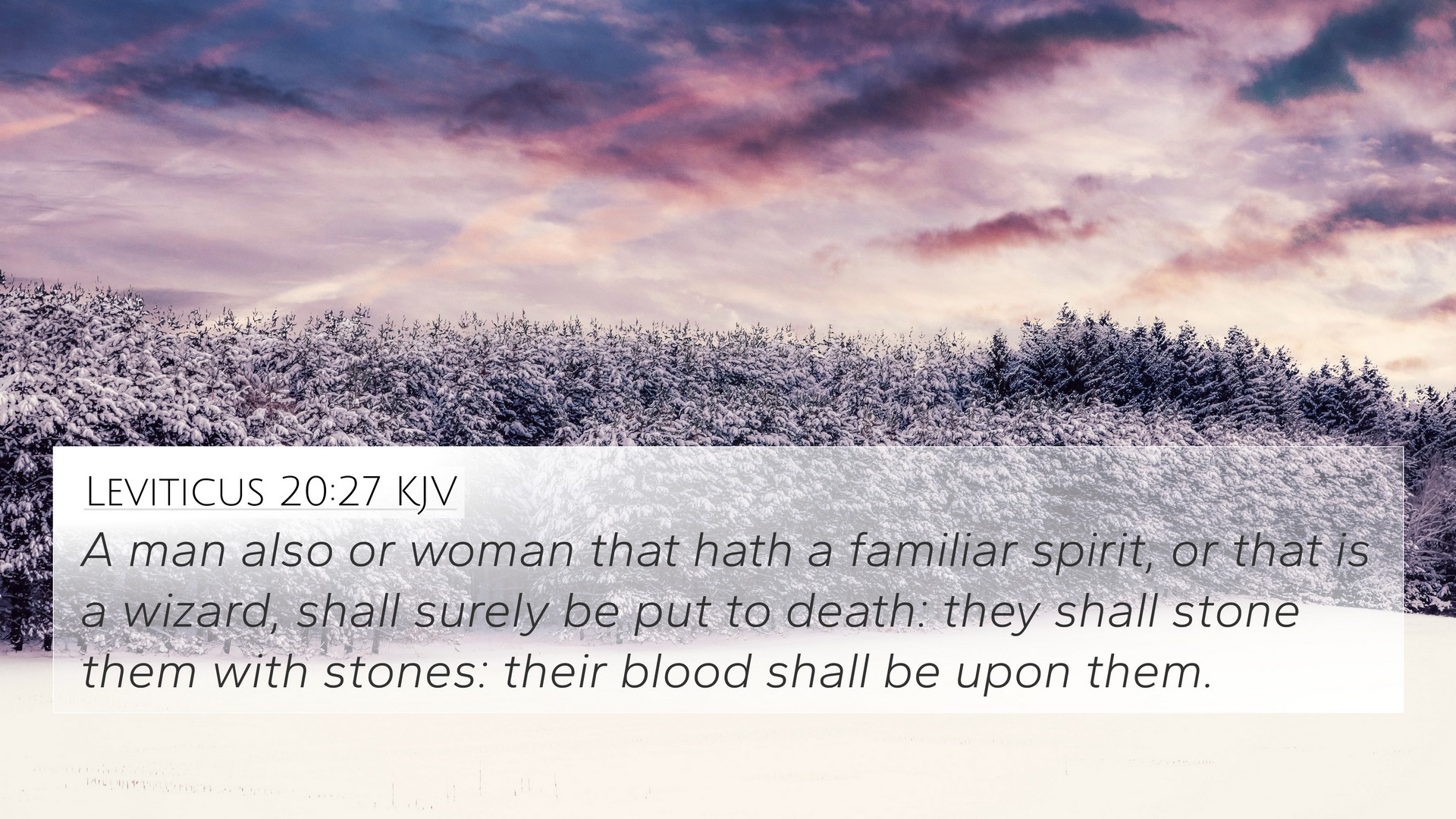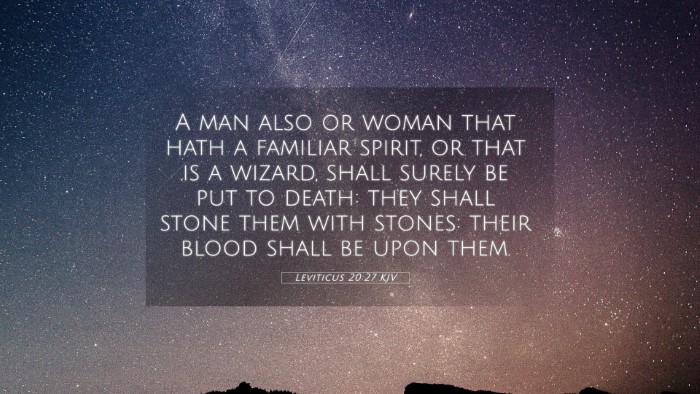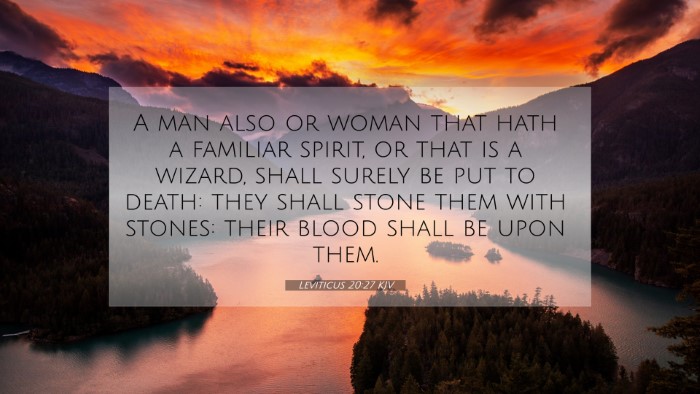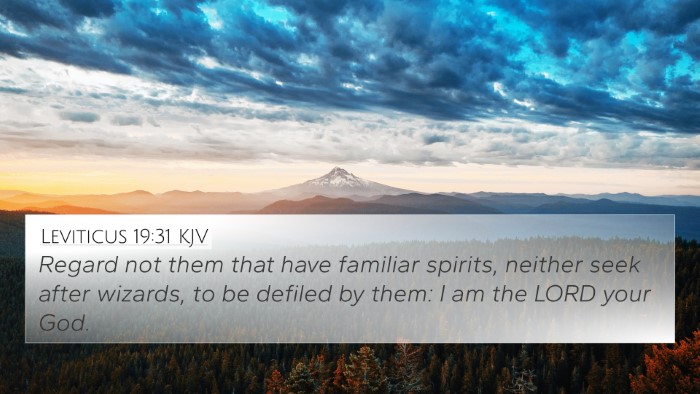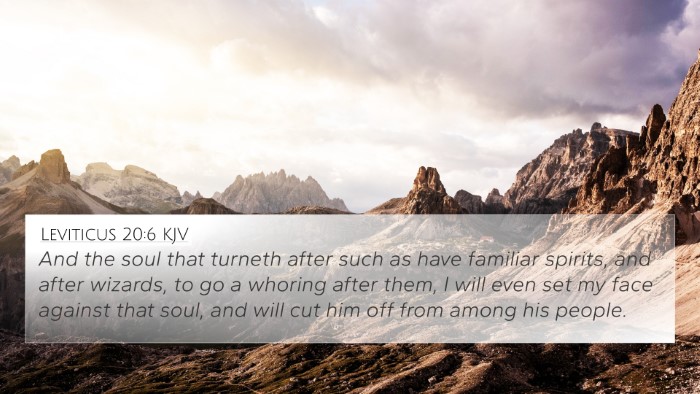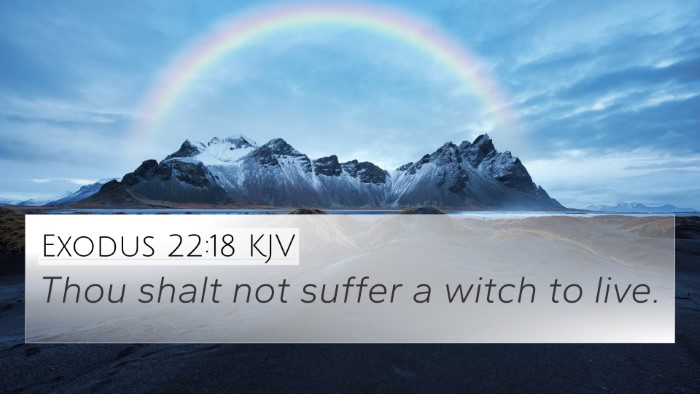Understanding Leviticus 20:27
Leviticus 20:27 states:
"A man also, or woman that hath a familiar spirit, or that is a wizard, shall surely be put to death: they shall stone them with stones: their blood shall be upon them."
Summary of Leviticus 20:27
This verse addresses the severe consequences for those who practice sorcery or consulting with familiar spirits, indicative of divination practices forbidden in the Mosaic Law. This harsh punishment emphasizes the importance of exclusive loyalty to Yahweh and the rejection of pagan practices prevalent among surrounding nations.
Insights from Public Domain Commentaries
Matthew Henry's Commentary
Matthew Henry notes that the term "familiar spirit" refers to a spirit medium or necromancer. He emphasizes the danger of such practices, which invite spiritual deception and lead people away from true worship of God. The decree reflects God's holiness and the severe stance against idolatry and occult practices.
Albert Barnes' Notes on the Bible
Albert Barnes highlights the societal implications of such practices, stating that they undermine the moral fabric of the community. He stresses that the death penalty serves as a deterrent that underscores the seriousness of these offences against God's commands. Barnes explains that the 'blood being upon them' signifies personal responsibility for their actions, devoid of any justification.
Adam Clarke's Commentary
Adam Clarke provides insight on the cultural context, describing the commonality of sorcery in neighboring tribes. He asserts that the laws against witchcraft were deeply rooted in protecting the people from spiritual corruption, reflecting God's righteous judgment against those practices. Clarke also interprets the basis for punishment as an essential element of maintaining national holiness.
Connections to Other Bible Verses
Leviticus 20:27 has several connections to other scripture that reinforce its themes:
- Exodus 22:18: "Thou shalt not suffer a witch to live." This reinforces the prohibition against witchcraft.
- Deuteronomy 18:10-12: "There shall not be found among you any one that maketh his son or his daughter to pass through the fire, or that useth divination, or an observer of times, or an enchanter, or a witch." Here, prohibitions against false divination practices are further emphasized.
- 1 Samuel 28:7-20: The story of Saul consulting the witch of Endor exemplifies the danger and consequences tied to necromancy.
- Galatians 5:19-21: "Now the works of the flesh are manifest, which are these; Adultery, fornication, uncleanness, lasciviousness..." The New Testament continues to stress the rejection of sinful practices.
- Revelation 21:8: "But the fearful, and unbelieving, and the abominable, and murderers, and whoremongers, and sorcerers..." describes the fate of those who practice such grievous sins.
- Isaiah 8:19-20: "And when they shall say unto you, Seek unto them that have familiar spirits, and unto wizards that peep, and that mutter: should not a people seek unto their God?" This is a clear call to reliance on God rather than the occult.
- 2 Kings 21:6: Describes Manasseh's sinful actions, including witchcraft, and its consequences for Israel.
Thematic Bible Verse Connections
In studying Leviticus 20:27, we may explore various themes regarding the integrity of worship, the danger of diversion into pagan practices, and the commitment required in serving God exclusively. This verse serves as a bridge within a broader biblical context that discusses sin, judgment, and redemption through Jesus Christ.
Cross-Referencing Biblical Texts
By referencing the verses noted above, one can engage in a comprehensive Bible cross-reference guide. This allows for deeper understanding and thematic connections across both the Old and New Testaments, showcasing the continuity of God's message concerning faithfulness and righteousness.
Practical Application
For contemporary believers, Leviticus 20:27 serves as a caution against spiritual practices that deviate from biblical teachings. Understanding its historical and cultural significance can lead to effective Bible cross-referencing in personal study or sermon preparation.
Tools for Bible Cross-Referencing
- Bible Concordance: A valuable tool for locating Bible verses on specific topics, aiding in cross-referencing.
- Cross-Reference Bible Study: Methods that allow believers to connect verses thematically or by context.
- Bible Reference Resources: Various guides and commentaries that facilitate deeper study.
- Bible Chain References: Linking passages to follow thematic threads through scripture.
Further Study Suggestions
When exploring connections between Leviticus 20:27 and other scriptures, it may be beneficial to:
- Engage in Comparative Bible Verse Analysis: Comparing themes and teachings in context.
- Identify Links Between the Prophets and Apostolic Teachings: Providing foundational understanding across scripture.
Final Reflection
In conclusion, Leviticus 20:27 not only illustrates God's judgment of grievous sin but also connects believers through inter-Biblical dialogue that spans across the entirety of scripture. By utilizing cross-referencing tools and engaging with these themes thoughtfully, one can develop a richer understanding of what it means to live faithfully amidst a culture that can often promote contrary beliefs.
